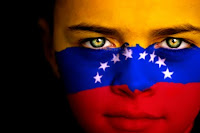Venezuela, the largest oil producer in South America, is shipping 200,000 barrels a day of oil to China to repay $20 billion of debt borrowed from the Asian nation to finance power, agriculture and technology projects.
The OPEC member, planning to ramp up China shipments to 1 million barrels a day by 2012, is selling oil at market prices to repay the 10-year loan, Oil Minister Rafael Ramirez said yesterday in an interview in Caracas. Shipments to repay the cash represent half Venezuela’s daily crude exports to China.
“We’re diversifying our export markets; our international policy is going in this direction,” Ramirez, also President of state oil company Petroleos de Venezuela SA, said at his office beneath paintings of Cuba’s Fidel Castro and Che Guevara. “We don’t cut prices in any of our international agreements.”
Venezuela is tapping Asian nations that need crude to fuel growth in their fast-growing economies for cash. President Hugo Chavez is seeking funds to restructure the country’s economy to provide more jobs for the poor and address power shortages.
China agreed to lend the Latin American nation $20 billion in April to finance development projects in return for future oil supplies. PDVSA, the state oil company, and China National Petroleum Corp. also signed a separate $16.3 billion joint- venture agreement this year for a project that will pump 1 million barrels a day of oil for Asian refineries.
Chinese Demand
The International Energy Agency projects China’s oil imports will almost quadruple by 2030 from 2006 levels. The nation’s oil use may average about 8.9 million barrels a day in the third quarter of 2010, up 9.5 percent from a year earlier, CNPC’s research unit said this week.
Ramirez, whose office is also adorned with a statue of South American liberation hero Simon Bolivar, said Venezuela operates two very large crude carriers with China and will start construction on a joint refinery at the end of this year in the Asian country. Venezuela is diversifying its export markets as Chavez distances himself from the U.S., the country’s largest trading partner.
Venezuela sent an average 1.01 million barrels of crude a day to the U.S. in May, down from a peak of 1.55 million barrels a day in 1998, a year before Chavez took office, according to the U.S. Energy Information Administration.
“Shipments to China are increasing, independent of what the U.S. does.” Ramirez said.
Growing Trade
Venezuela tapped the first $5 billion of the $20 billion credit line with China, which consists of $10 billion in U.S. currency and $10 billion in Chinese yuan, PDVSA said in a statement on July 29. Morgan Stanley, in an Aug. 2 report, said exports to Asia “may not be made at market prices, but rather at a discount.”
President Hugo Chavez said in April that the credit line is the largest that China Development Bank Corp. has extended to any country. Trade between China and Venezuela surged to $8.9 billion in 2008 from $85.5 million in 1999, according to Venezuelan state bank Bancoex.
Venezuela, which has forged close ties with Iran, isn’t currently supplying the Persian country with gasoline amid fresh economic sanctions from Europe and the U.S., which Ramirez called “savage” and “pre-war” measures.
“The shipments of energy to Iran haven’t been frequent,” he said. “Several occasional deliveries were made before the sanctions. At this moment we haven’t programmed any shipments, but it has nothing to do with the sanctions.”
BP Assets
Ramirez, 47, said that the government hasn’t received a formal request from BP Plc to sell its Venezuelan assets as part of a global divestment plan to raise as much as $30 billion for cleanup efforts in the Gulf of Mexico after the Macondo well oilspill.
PDVSA, which finances Chavez’s social programs including adult education courses, food distribution units and other non- oil activities, saw its profit fall 53 percent to $4.4 billion in 2009 due to cuts in production at the Organization of Petroleum Exporting Countries and a slump in prices.
Ramirez, who helped counter a two-month oil strike intended to oust Chavez from power in 2003, is also a leading member of the ruling United Socialist Party of Venezuela. Elevators at the Oil Ministry say “moving towards Bolivarian socialism” in electronic lettering next to the floor number.
Venezuela, a founding member of OPEC, will maintain current crude production of 3.01 million barrels a day this year and doesn’t expect an output increase for the Vienna-based group of 12 petroleum exporting countries, Ramirez said. The country plans to boost production to 4 million barrels a day in 2015, he said.
Crude oil, which has averaged $78.27 a barrel this year, should rise further to within a price band of $80 a barrel to $100 a barrel, he said in the interview.
“We’re satisfied because the tendency is for oil to get closer to a fair price,” Ramirez, wearing a dark blue suit and glasses, said. “We’re preparing our production capacity to be ready for when OPEC decides to increase our quotas.”
To contact the reporter on this story: Daniel Cancel in Caracas at dcancel@bloomberg.net;Corina Rodriguez Pons in Caracas at crpons@bloomberg.net

Δεν υπάρχουν σχόλια:
Δημοσίευση σχολίου